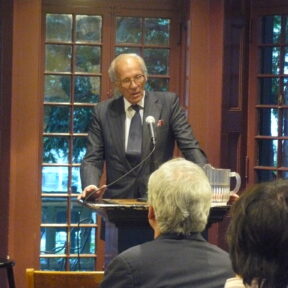
Lewis Lapham
: Photo from Creative Commons / Author of Photo: kellywritershouseOverview
* Longtime editor of Harper’s magazine
* Great-grandson of Texaco Oil co-founder
* Grandson of mayor of San Francisco
* Views America as a nation where upward social mobility is nothing more than a myth, and where one’s station in life is largely predetermined by his or her race, gender, or class
Lewis Lapham was born in January 1935 in San Francisco, where his grandfather would be elected mayor seven years later. Lapham’s great grandfather was one of the founders of Texaco Oil.
“I was born into the ranks of the equestrian class and educated to the protocols of wealth at prep school and college,” Lapham wrote in his 1988 book, Money and Class in America: Notes and Observations on Our Civil Religion. “Ambition, like leather jackets, was best left to the poor,” he added. “Everybody who mattered already had arrived at all the places that mattered, and anybody who seemed to be in too much of a hurry to get somewhere else (presumably somewhere he or she didn’t belong) must be considered a person of doubtful character or criminal intent. Why would anybody want to strive for anything if all the really important prizes had been handed out in the maternity ward at New York Hospital?”
Lapham’s point, in other words, was that America was a nation where the opportunity for upward social mobility was nothing more than a myth, and where one’s station in life was largely predetermined by his or her race, gender, or class.
Lapham attended the Hotchkiss Boarding School (in Lakeville, Connecticut), Yale University, and Cambridge University. After completing his formal education, he considered becoming a history professor but decided instead to work as a reporter for the San Francisco Examiner (1957-59) and New York Herald Tribune (1960-62). He later became Managing Editor of Harper’s magazine (1971-75), and then its Editor (1976-81).
In 1981 the board of the Harper’s Magazine Foundation, which had recently bought and rescued the eponymous periodical from the brink of bankruptcy, fired Lapham and replaced him with Michael Kinsley.
In 1983, however, Lapham was restored to his editorial post at Harper’s as a result of intervention by John R. “Rick” MacArthur, who, with Lapham’s help, had recently secured his place as head of the Harper’s Magazine Foundation. From that position of power, MacArthur ousted Kinsley and brought back Lapham, who would remain in the Editor’s chair at Harper’s until 2006. Lapham also worked as a syndicated columnist from 1981-87.
Lapham’s writings return again and again to a handful of overriding themes, most notably the notion that people of inherited wealth are undeserving of their privilege and power, and that America’s decadent, money-ruled, imperialistic society will soon meet its richly-deserved end. These recurrent ideas reverberate in the titles of several Lapham books, including Imperial Masquerade (1993); The Wish for Kings: Democracy at Bay (1993); The Agony of Mammon: The Imperial Global Economy Explains Itself to the Membership in Davos, Switzerland (1998); Fortune’s Child: A Portrait of the United States as Spendthrift Heir (1994); _Hotel America: Scenes in the Lobby of the Fin-de-Siecl_e (1995); Waiting for the Barbarians (1997); and The End of the World: History of Doomsayers (2000).
“The Bush Administration’s imperialist policy,” wrote Lapham in the July 2004 edition of Harper’s, “amounts to little else except another name for terrorism — precision-guided and digitally enhanced but otherwise similar in its objectives to the action-movie sequence that destroyed Manhattan’s World Trade Center.”
In a forum that appeared in Harper’s the following month, titled “Liberalism Regained: Building the Next Progressive Majority,” Lapham wrote:
“The reactionary right isn’t afflicted with the disease of cognitive dissonance. It enjoys the services of a propaganda ministry funded over the last thirty years by romantic billionaires who believe that they are rescuing the country from godless liberalism…. What holds the factions together — the Christian and neoconservative right, the racists and the homophobes — is their common tendency to believe in such a thing as absolute truth, the bright transcendent line between good and evil, right and wrong.”
An article in the September 2004 issue of Harper’s caused considerable embarrassment for Lapham and his staff. The piece reported that the speeches delivered at that year’s Republican National Convention in New York:
“… affirmed the great truths now routinely preached from the pulpits of Fox News and the Wall Street Journal — government [is] the problem, not the solution; the social contract [is] a dead letter; the free market [is] the answer to every maiden’s prayer … How did a set of ideas both archaic and bizarre make its way into the center ring of the American political circus?”
It was soon discovered, however, that the foregoing report had been written more than a week before the Republican Convention began. “If I’d had my wits about me as an editor,” Lapham wrote thereafter in a detached apology, “I wouldn’t have let the author mix up his tenses in manuscript or allowed him in page proof to lapse into poetic license. Both of us regret the injury done to the magazine and apologize, wholeheartedly, to its readers.”
In the spring of 2006, Lapham announced that he was stepping down from his position as Editor of Harper’s and would thenceforth assume the title of Editor Emeritus. He continued to write his “Notebook” column for the magazine, and he became the Editor of a new journal about history, Lapham’s Quarterly.